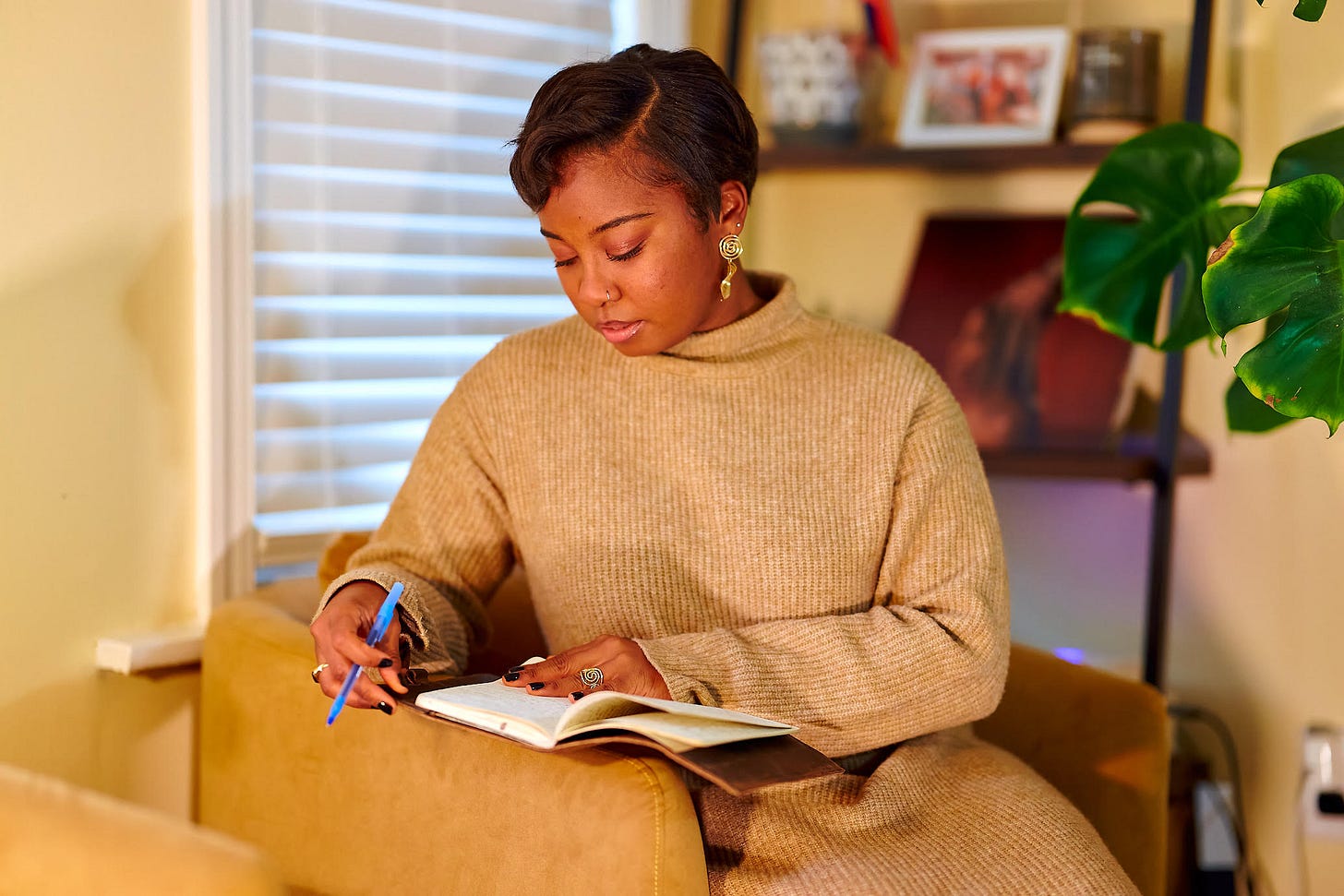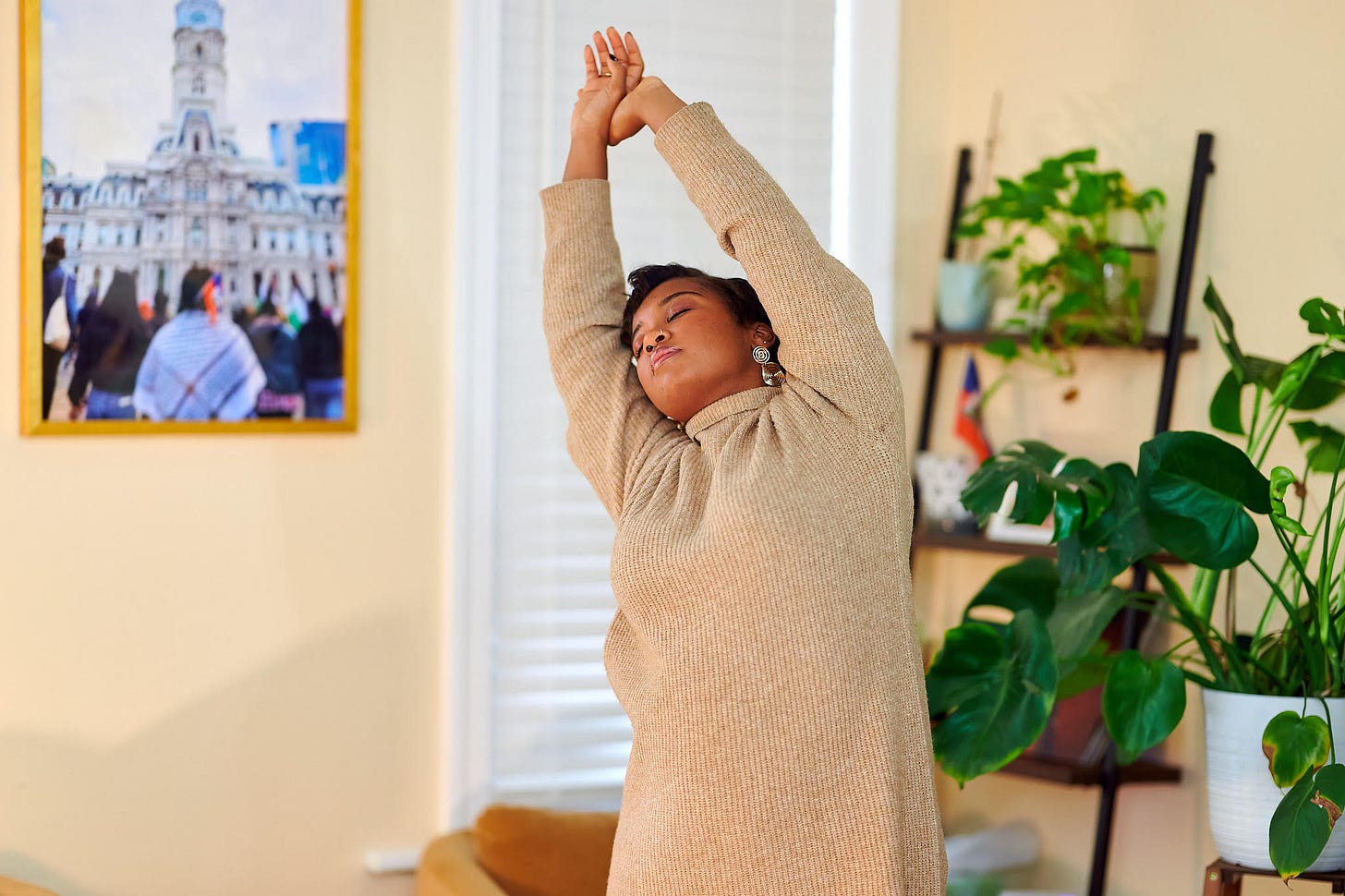"I have to believe the work is inherently useful because it frees me."
Educator and writer Saskia Kercy on constant revision, reimagining new realities, and how everything counts.
If someone forwarded this to you, subscribe here! If you want to get in touch, email here!
Freedom Ways is an interview & essay series exploring the intersection of artistry and liberation, illuminating how art serves as both personal transformation and collective resistance. Our sixth Freedom Ways interview features Saskia Kercy, a scholar-activist, educator, and writer. Enjoy!
If you know or are someone who would like to be considered for our Freedom Ways series, send us an email by replying to this newsletter.
Saskia Kercy is a scholar-activist, educator, and writer from Philadelphia by way of Haiti. An adjunct professor of economics, she currently serves as a research consultant, organizer, teaching artist, and creative writer. She has two Bachelor’s in Economics and Global Studies from Temple University, and a Master’s in Economics from Howard University. Among her research accolades, including the Norman and Ruth Sun Memorial Award in Economics, Saskia has presented on wealth inequality, economic mobility, community development, and comparative politics at conferences around the country. Staying true to her poetic practice, Saskia is a workshop facilitator at Blue Stoop, an Anaphora Literary Arts Fellow, and a May Miller Creative Writing Award recipient. Moreover, she sits on the programming committee of the Painted Bride. Her publications include essays, reports, and poems in the Washington Informer, the Root, the Sadie Collective, and the Amistad, among others. More from this eldest daughter @saskiakercy and bysaskia.co.
—
What is a moment from your personal or family history that has informed the way you think about liberation?
I come from two distinctly oppressed communities with a history of resistance and liberatory action — Haiti and Southwest Philly. It’s hard to place a singular moment in my radicalization, as I was raised in a pro-union, pro-Black, anti-colonial environment. My family left Haiti at the height of Jean-Bertrand Aristide’s presidency, and shortly after starting kindergarten, 9/11 happened. A month later my mother told me Columbus Day was a sham, and while it didn’t all make sense then, my political consciousness began forming rather early. My mom is brilliant but had to redo her bachelor’s degree because the U.S. didn’t accept it. I got my first job at fourteen out of necessity and saw how predatory credit and tax structures could be. None of this was unique to the Black, Brown, immigrant, or poor people in my community.
By the time I visited Ghana in college, I had all the bones of a revolutionary — I just needed the books. Each life event confirmed my growing skepticism for the hypocrisy of this country and others like it. I couldn’t unsee it or continue business as usual; I refused to accept that this was the only way to live and realized there was a whole network of people actively reimagining this reality. I’m not sure if they found me or if I found them, but now that I’m here, there really is only one solution: intifada, revolution.

Why do you write?
Courage is not the absence of fear; courage is doing it anyway – word to Audre Lorde. I write for my younger self who was too afraid to advocate for herself, who found her voice on the page when no one would listen. I think of her, who didn’t know how to correct people when they said her name incorrectly. The girl who built alternate universes when the real world was not kind. I realized, early, that there was language for those feelings, and that validation gave me hope that life was worth staying curious about and not giving up on. I have eleven volumes of my life chronicled in journals and love that I can relive my own evolution through my words. Of course, I’m still afraid. But writing and sharing that work with others has revealed how interconnected our experiences are, from Philly to Haiti. If we can find solidarity in the loneliness of our struggles, we can build collective power and be courageous together. My literary predecessors used language as a conch to inspire revolution and transformation in the midst of chaos. So I no longer write for myself, alone, but for us all – to contribute to the canon of radical love and the healing of humanity.
Community is always rooting me, pushing me to be better, giving me strength to broaden my imagination and find ways to resist.
Which texts/writers/works of art ground you as a writer working during various collective crises?
I was radicalized one summer in Ghana after reading The Autobiography of Assata Shakur. I am similarly inspired by those who have done the work and lead by example including aja monet, June Jordan, bell hooks, Sonia Sanchez, Frantz Fanon, Angela Davis, Saul Williams, and Octavia Butler — whose parables remind me that the only thing between our imagination and our reality is a single seed. Community is always rooting me, pushing me to be better, giving me strength to broaden my imagination and find ways to resist.
What do you believe is the role of creativity in collective resistance?
Well, I would concur with Toni Cade Bambara that the role of the artist is “to make revolution irresistible.” Artists are world-builders, cultural workers, and truth-tellers. If life imitates art, then, surely, what we create shapes the world around and within us. What we create inspires movements and is often the catalyst for transformation, moving people away from complacency and towards liberation. As writers, we can literally map the blueprint of the world we want to see from speculative fiction to poetry. We inspire revolution, we make it difficult to look away from the ugly and can even find the beauty in it. We document, archive, and foresee the truth. If art wasn’t powerful or necessary, why do they always try to kill the poets? Or convince us that we’re too poor, too weak, to fight back. It wouldn’t matter, though, because poetry lives forever. Our poetry, our art, our creativity, is our collective resistance. Always has been.

What does the practice of writing teach you about living?
You have to be open to constant revision. Don’t attach yourself to a plot. In fact, just accept the inevitable plot twist. Be consistent. Be vulnerable. It may take a while. Trust your intuition. You may be wrong. Feedback is important. Spelling counts.
I feel urgency, yes, and I put a lot of pressure on myself to achieve, but I know that everything counts. Nothing goes without saying. Someone is noticing, even if it’s your inner child.
Do you feel an obligation to be useful or make your work useful? How do you navigate that?
I have to believe the work is inherently useful because it frees me. And in that freedom and courage and (com)passion, I’ll either live a meaningful life or inspire someone else to walk in their truth, too. It’s cool that I get to see the tangible results of my work — whether it’s writing or researching or teaching — but it’s not more important or valuable than the next person’s work or art. I feel an obligation to serve and care. I feel urgency, yes, and I put a lot of pressure on myself to achieve, but I know that everything counts. Nothing goes without saying. Someone is noticing, even if it’s your inner child. If it’s real and true and rooted, then it serves its purpose, whether or not it’s been validated.
We’re all soldiers, no matter our roles. And our pen, our voices, our truth is our weapon.
How do you see the relationship between writing and liberatory action?
Realizing your role in the revolution is powerful work, and understanding that roles evolve is the wisdom of consistency. The revolution needs writers and lawyers and healers and teachers and doulas and builders and farmers and musicians and protectors and everything in between. Writing is as much of a liberatory action as loading the gun — each role an important piece of the struggle. The IT guy in the military is a soldier too, no? So, too, is a writer in liberatory action. We’re all soldiers, no matter our roles. And our pen, our voices, our truth is our weapon.
How do you survive?
I survive by writing, reading, playing, dreaming, learning, resting, laughing, running, stretching, remaining curious, and doing my best. Existing in survival mode has taken a toll on my body and spirit — a consequence of constant pressure and needing to feel prepared for the plot twists. I’m the friend who has a checklist for everything, whose bunker is ready for The Purge, who has trained her body and mind to defend and protect by any means necessary. However, I am learning to surrender to the unknown, release control, and accept that the word has already been written. I don’t want to survive this alone, and existing in a state of panic may hinder me from surviving at all. These days I survive by staying present, by not taking myself too seriously, and by living intentionally and with integrity. I don’t want to simply survive. I want to enjoy whatever this life has assigned me. So I guess I survive off of faith. And there’s nothing more powerful than that. But love.
Related reading
Thank you for reading this edition of Freedom Ways. Become a paid subscriber to help us continue this valuable work and share us with a friend or two.






![Submissions | Writing a Liberatory Practice [A Lit Lib x Memoir Land collaboration]](https://substackcdn.com/image/fetch/$s_!gfBY!,w_140,h_140,c_fill,f_auto,q_auto:good,fl_progressive:steep,g_auto/https%3A%2F%2Fsubstack-post-media.s3.amazonaws.com%2Fpublic%2Fimages%2Fa9a39cd6-0ccd-471f-bc77-cd4e10a03dcb_1200x800.heic)